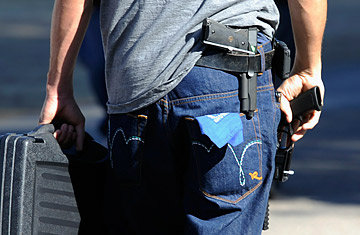
A man walks the grounds displaying his weapons for sale at the Crossroads of the West Gun Show at the Pima County Fairgrounds on January 15, 2011 in Tucson, Arizona.
Correction Appended: Jan. 24, 2011
Will the Tucson massacre change Arizona? Perhaps, if an extraordinary event on Jan. 10 at the beginning of the state's legislative session last week is an indication. In the House of Representatives, Majority Leader Andy Tobin, a rural Arizona Republican, and Minority Leader Chad Campbell, a Phoenix Democrat, stunned onlookers by exchanging an embrace. The two men — who had previously voted on opposite sides of Arizona's controversial immigration bill — agreed to work together.
Stan Barnes, a respected GOP strategist in Phoenix and former Arizona state senator, says he expects politicians here — particularly the newly elected conservatives — to ease up on their partisan posturing in light of the Jan. 8 shooting. "My most accurate read on the lay of the land post-tragedy is that most people will tone down their hot rhetoric and even go old-style - 'honoring your opponent,' the way it used to be." The political gamesmanship this spring, he reckons, will be more of a throwback to mutual respect and teamwork that predates the Internet Age of politics by a decade or two. "We might get a 'reset' out of this tragedy," he says.
Or maybe not — for one big reason, guns. On Saturday, while ABC TV producers were taping a show that reunited people who were at the scene of the shooting, one of the victims in the audience, Eric Fuller, was arrested after he had a verbal exchange with a Tea Party supporter who spoke up against revising gun laws too quickly.
Don't expect the Tucson incident to turn the state against its reputation as one of the most gun-friendly places in the nation. Even Barnes, for all his optimism about political rhetoric, agrees with other onlookers that the Arizona Legislature will enact more laws that support carrying guns, not restricting them. Indeed, in the state Senate chambers, across the way from where Tobin and Campgell hugged, incoming Republican Lori Klein, who represents Anthem, Ariz., brought her .38 special to work with her in her purse. She knowingly walked past a posted sign on the door that banned firearms from being brought into the building, telling local media she believes lawmakers are exempt from the ban.
Republican Gov. Jan Brewer has signed off on a raft of liberalized gun laws. Nowadays, bar patrons with concealed-weapons permits can carry guns into the bar as long as the gun is concealed, they are not drinking, and the bar does not have a "No Guns Allowed" sign posted. Since last October, residents who qualify for gun ownership don't even need to obtain a concealed-weapons permit to carry a gun in a concealed fashion.
That last one makes Scottsdale's Tim Forshey uncomfortable. Forshey, 49, is a local attorney and judge who has taught firearms-safety classes since 1995 and provides instruction at the posh Scottsdale Gun Club. He says he's a libertarian and staunch supporter of the Second Amendment, but even he grudgingly thinks Arizona may need to take a second look at its gun laws — and consider a new piece of legislation that would give health care and education officials more say in the gun-buying process. Forshey says a law allowing them to report mental health incidents to the same national database the FBI uses to screen gun buyers could avert future tragedies like the Tucson shooting. "With the mental health issue, that's where the system falls short," Forshey says. "We should tighten things up reasonably."
Business boosters here say that whatever gun measures are passed this spring, lawmakers should balance them with the state's frontier image. Swinging too far toward the saloon door could scare away new businesses. To that end, a proposed law that would let college faculty with the proper permits carry concealed weapons on campus should be handled with caution, says Jack Lunsford, a longtime Arizona lobbyist who now oversees Westmarc, an organization that promotes economic development in Phoenix's western suburbs. The group just successfully inked a deal that will offer tax incentives to renewable energy businesses if they move to the region. "It's about the perpetuation of that Wild West mentality," Lunsford says. "Is that the image we want to create for the attraction of new business?"
Correction: The original story provided the wrong chronology of Tim Forshey's history as a gun instructor. It also misconstrued Forshey's advocacy of gun legislation. He has not advocated taking a second-look at Arizona's concealed weapons law.
